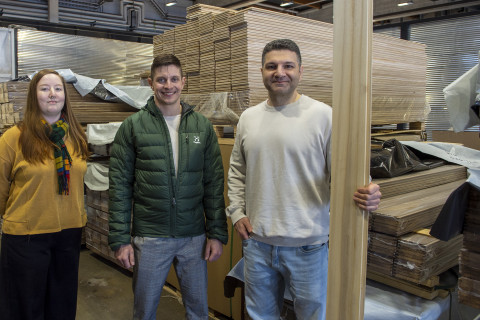Metsäpalvelu Turunen, a Finnish forest sector company, benefits from the valuable expertise of international students involved in the UEF Trainee Programme in expanding the company’s business abroad.
“The UEF Trainee Programme is an excellent example of how international students can apply the skills they’ve learned to practice in working life. UEF Trainees’ cultural competence provides support for our international business,” says entrepreneur Pauli Turunen from Metsäpalvelu Turunen.
The UEF Trainee Programme is an internship programme of the University of Eastern Finland that promotes the employment of international students in Finland. Through the programme, students of natural sciences Aleksandra Bokareva and Mohammad Azarmi secured internships at Metsäpalvelu Turunen.
Metsäpalvelu Turunen is a forest sector company based in North Karelia and seeking to enter the international markets. The company specialises in the planning and management of forestry sites that are located in the immediate vicinity of electric networks and roads. The company also deals in timber and provides forest management services and expertise to public bodies, forest funds and investors.
The company operates in all of Finland and seasonally employs as many as 40 subcontractors. At the same time, the company is also seeking to enter the international markets. Pauli Turunen is responsible for the company’s new business activities and internationalisation.
“At Metsäpalvelu Turunen, we are seeing that there is a need for our skills also abroad. Our own expertise and networks of collaboration can be turned into tailored international business activities but first, we need to explore how the regional markets abroad operate. The further we go, the better we must understand the markets and their operational culture. International students’ cultural competence is a key to this,” Turunen points out.
A flexible and low-hierarchy work culture creates a good atmosphere
Pauli Turunen understands the benefits of the UEF Trainee Programme well; after all, he’s a former participant. Turunen used to study at the University of Eastern Finland, and he is currently conducting doctoral research in business studies, focusing on entrepreneurship.
“I’m a qualified teacher and I have a Master’s degree in international sales. I see that there is a need for international students, but regrettably few experts eventually secure employment in the private sector. Based on my own experience, I can certainly recommend international trainees to other entrepreneurs as well.”
In the UEF Trainee Programme, the internship usually lasts for two months of full-time work. Aleksandra Bokareva’s and Mohammad Azarmi’s internship at Metsäpalvelu Turunen is spread over four months to give the students time to find other jobs and to organise their studies more flexibly.
“We work flexibly both at the office and remotely from home. And it’s always okay to ask if something is unclear. Since we’re all students, there isn’t really any distance between us,” Turunen says, describing the company’s low-hierarchy work culture.
A traineeship opens doors to future employment
Aleksandra Bokareva’s and Mohammad Azarmi’s specific skill sets complement each other at Metsäpalvelu Turunen. Aleksandra Bokareva’s diverse background in the natural resources sector helps the company to understand the natural resources and forestry sectors of southern and eastern Europe. Mohammad Azarmi’s strong engineering background, on the other hand, comes in handy in productization and industrial engineering.
Aleksandra Bokareva noticed an advertisement of the UEF Trainee Programme and discovered that Metsäpalvelu Turunen offered a placement that matched her experience, skills and interests. This is her sixth time working on the Finnish labour market. She has previous experience of newspaper delivery and working as a kitchen assistant, as well as of an internship in Lammi Biological Station of the University of Helsinki and working as a research assistant at the University of Oulu and the Natural Resources Institute of Finland.
“This is the first professional experience from the field of forestry. I find the experience highly valuable, and I appreciate the flexibility of the work. I’m confident this employment is a key that will open many doors in my future career,” Aleksandra Bokareva says.
Mohammad Azarmi, a Master’s degree student of wood materials science, learned about the UEF Trainee Programme on the university's website and also heard about it from his friends and teachers. Metsäpalvelu Turunen’s advertisement caught Mohammad Azarmi's attention, and the placement offered by the company was perfectly aligned with his field of study. The internship is also Mohammad Azarmi’s first time working on the Finnish labour market.
“I feel that working is easy-going and without much detrimental pressure. Everything can be discussed, and problems resolved through cooperation. This internship is of course useful, because it gives me the opportunity to get acquainted with Finnish working conventions and rules, like the relation between managers and employees, and learning about Finland’s tax practices. I’ve gained practical and precious knowledge about the marketing and markets of wood products and different wood materials in Europe,” Mohammad Azarmi says.
Both Aleksandra Bokareva and Mohammad Azarmi encourage fellow international students from the University of Eastern Finland to apply to the UEF Trainee Programme.
“My advice is to apply to all possible options and not miss the opportunity. It is also advisable to carefully read the websites of the companies and organisations offering placements, and to build your CV and motivation letter so that the HR sees the link between their business and your competencies,” Aleksandra Bokareva says, sharing her tips.




